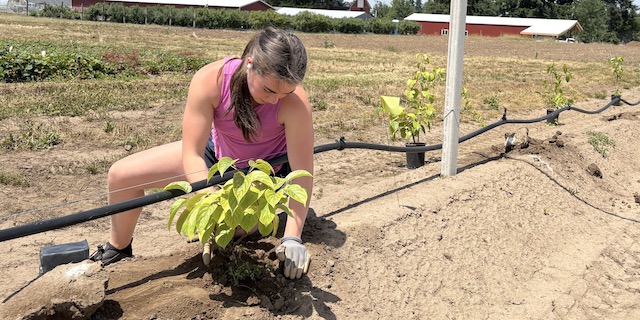Longtime Spokane Conservation District leader ushers in year-round farmers market
Published 8:14 am Thursday, May 22, 2025

- Spokane Conservation District director Vicki Carter stands amid Scale House Market construction March 13. Carter is proudest of her team at the district.
“The work they do, the expertise they bring and the passion that they have make everything that I do possible,” she said. “I couldn’t do it without them; this is not a one-person job.” (Matthew Weaver/Capital Press)
SPOKANE — Vicki Carter walked with purpose, and excitement, through construction at the Scale House Market on a spring morning.
She checks on the building’s progress multiple times a day, she said.
The longtime Spokane Conservation District director paused several times to chat warmly with construction crew members and mural painters.
Warmth and kindness are hallmarks of Carter’s style of leadership.
“My two favorite people in the world are veterans and farmers,” Carter said. “This is the job where I got to be right in the center of all of it. And really be a catalyst for change in a lot of those programs and projects.”
The year-round farmers market will have its grand opening May 31. The $4.4 million building will house 65 vendors. The district received more than 150 applications.
Farmers can participate in a typical farmer’s market stand, selling their product directly to consumers. They can wholesale to Four Roots, a local, female veteran-owned food distribution organization and operating entity for the market. Or there’s collaborative dry or refrigerated shelf space, where farmers will stock and manage products, splitting revenue.
The market also offers an on-site commercial kitchen and refrigerated/freezer storage.
“Vicki is one of those people who really sees a need and finds a way to fill it,” said Brittany Tyler, owner and CEO of Four Roots. “This project has become really a lifeforce of its own … It’s really been a passion project and there’s nobody I’d be more honored to work with on this than Vicki.”
The district recognized a need while observing food transportation difficulty during the COVID-19 pandemic and discussions about food insecurity, food access and economic barriers for small producers, Carter said.
The USDA identified 38 “food deserts” in the Pacific Northwest, areas that lack reliable access to fresh and affordable food, impacting 20% of residents, Carter said.
The Scale House was an existing building on the district property, a former rock quarry. The district conducted a feasibility study in 2022 to explore turning it into a regional food hub.
“This is like the pinnacle for me, this is a dream come true,” Carter said. “I’ve worked for the Spokane Conservation District for 35 years, and to be able to bring this to Spokane, and to our local producers and consumers, all in the name of promoting better quality food and better access for our consumers — it’s everything I believe in.”
‘I’ve grown up with the district’
Carter started out at the district working the front desk, answering phones, taking care of customers and helping with the tree sale. About six months later, she took over as office manager.
She has been director since 2011.
“I’ve grown up with the district,” she said. “When I started here we had four employees and an annual budget of $150,000.
I’ve done pretty much every position — not the technical positions — within district operations, from human resources, finance, budget and accounting, public outreach, communications, policy and legislative work,” she said.
Today, there are 24 full-time employees, 37 during the height of seasonal work, and a $16 million budget.
Carter points to the partnerships between state funding, grants and private funding.
The district is fundraising for its capital campaign for the farmers market. The current goal is $350,000. About $250,000 has already been raised.
‘So much goodness’
The market is expected to draw about 250,000 people each year, Carter said. More than 18,000 have been estimated to be food-insecure and eligible for food assistance programs through the market.
“It empowers 65-plus small farmers and small businesses,” she said, noting some are first-time and minority businesses.
The Washington State Small Business Development Center is co-located on the district campus, offering wrap-around business support services, including financial literacy and developing a business plan.
The market uses a single-source point-of-sale system, allowing farmers access to data to determine their input costs and cost margins, Carter said.
The market is projected to generate about $14 million in sales each year.
“There is so much goodness on so many different levels that this brings to our community,” Carter said. “I couldn’t be more honored to be part of the Spokane Conservation District and Upper Columbia Resource Conservation and Development Council bringing this forward to Spokane and the region.”
Vets on the Farm
The district’s Vets on the Farm program marked its 10th anniversary in February. There will be a celebration in the new market in September.
Carter recalled attending a screening of the documentary “Ground Operations: Battle Fields to Farm Fields,” about post-Sept. 11 veterans struggling to reintegrate back into regular jobs.
In the film, Farmer-Veteran Coalition director Michael O’Gorman recognized how the farming population was aging, and noted that military skillsets align with agriculture.
“I had an ‘Aha’ moment,” Carter said.
The program has helped hundreds of veterans transition into agriculture-based careers.
“The camaraderie gives them a sense of connection to their brotherhood or sisterhood of fellow veterans, and that is a powerful thing,” she said.
Farm manager Grant Weber first joined the program as a volunteer.
“She will do anything for you — she does expect a lot out of you, but she gives you everything you need to accomplish your mission,” Weber said.
The quarry
While driving out to Vets on the Farm’s 3-acre farm, Carter would pass the 50-acre former rock quarry that is now the conservation district’s base of operations.
She oversaw relocation in 2021, as the district’s lease on its previous building ended.
“It was probably the biggest blessing that could have ever come our way,” Carter said. “Just what this offers in terms of a resource back to the community is worth its weight in gold.”
The new site allows the district to demonstrate its programs, host classes and meetings and events. It includes a preschool, raising a new generation of “community-minded conservationists,” she said.
“What a perfect new beginning to this property that served decades as a quarry, being mined out for its gravels and rocks, which supported and contributed to our community in the way of roads, concrete, asphalt and what-not,” Carter said.
“Now it has this next-life where we are restoring and re-naturing it, really letting it go back to its former glory and beauty,” Carter said. While we’re doing that, we get to teach people about that whole process and the delicate balance between what we use as resources and what we protect for the future.”
Vast impact
“There is nobody I know of that has had a larger impact and continues to impact the industry as a whole, because it’s not any one facet of the industry that she is working towards the betterment of,” Tyler said of Carter. “It goes from the backyard gardener all the way to large-scale commodity agriculture production. Her impact is incredibly vast and will create positive change for generations to come.”
Carter was a mentor during the formation of the Columbia Community Creamery in Chewelah, Wash., the nation’s first and only non-profit milk processor, said board member Virginia Thomas.
Thomas, who owns the Clover Mountain Dairy in Chewelah, first met Carter through Vets on the Farm.
“Some of her biggest strengths are her ability to see different parts that can be connected together, and how we can best connect them together to improve everybody,” Thomas said.
“She doesn’t do anything halfheartedly,” said Weber, the Vets on the Farm farm manager. “She’ll fight for you, and she’s very passionate about the projects she takes on. There’s no way that project’s not getting done or accomplished. She’s given way more than she’ll ever get back.”
The future
Carter will continue at the conservation district for several more years. She sees herself remaining in a development role.
“My goal when I do leave is that the Spokane Conservation District is just set for the future, on track for its 100th birthday, and Spokane has this well-rounded resource available to them for all things conservation-related,” she said. The district will turn 100 in 2041.
Carter’s message to farmers:
“Come grow with us, and I mean in that in every sense of the word,” she said. “Come grow with us with your business, as we build out this regional infrastructure for farming, as we look at agriculture through a different lens into the future.”






